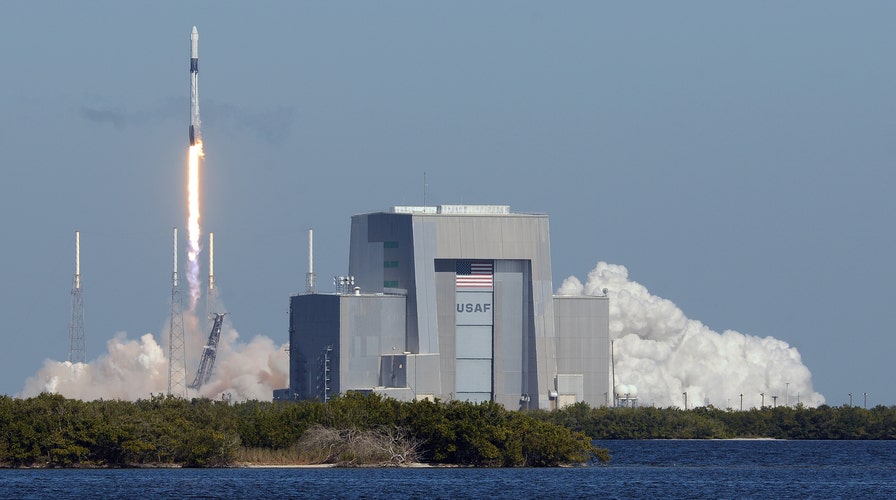NASA releases stunning new reconstruction of what Buzz Aldrin saw during Apollo 11 moon landing
NASA reconstructed the view from astronaut Buzz Aldrin's window on the Lunar Module Eagle and displayed it side-by-side with the original 16mm film.
The idea of alcohol in space may seem outlandish, but a number of companies and organizations are ready to tap into some new opportunities.
On Dec. 5, SpaceX launched a 3-ton shipment to the International Space Station containing a miniature of a brewery's malt house. The barley grains were sent into space for a beer-malting experiment by Anheuser-Busch. It's the latest in a series of Budweiser experiments to explore how barley germination is affected by weightlessness.
Gary Hanning, director of global barley research at Anheuser-Busch told Fox News that the malting experiment is the company's third, following research projects that shipped dry grain into space and analyzed gene germination.
SPACEX LAUNCHES PAYLOAD OF 'MUSCLE MICE,' BARLEY GRAINS TO SPACE STATION
With regard to the dry grain that was shipped to space, Hanning told Fox News that, when the seed was returned to Earth, the company saw some differences in the field where it was planted, but these disappeared the following year. In the gene germination experiment, Anheuser-Busch noted considerable differences on the ISS compared to Earth, particularly in cell structure components and metabolic pathways.

December 5, 2019 - Cape Canaveral, Florida, United States - A SpaceX Falcon 9 rocket carrying a Dragon cargo capsule with supplies for the International Space Station launches successfully from pad 40 at Cape Canaveral Air Force Station. (Photo by Paul Hennessy/NurPhoto via Getty Images)
"As for the current [beer-malting] experiment, the malting process involves moving air and water and controlling temperature," Hanning told Fox News, via email. "A great deal of the experiment is to better understand the interaction of processes in space."
"There is considerable amount of interest in Space, the ISS, Moon, and Mars, these days and Budweiser wants to better understand how its ingredients react in microgravity environments so that when we get to Mars, Budweiser will be there," Hanning added. "It’s a brand with a history of pushing innovation boundaries and we are looking forward to sharing what’s to come."
APOLLO 8 ASTRONAUTS RECOUNT NASA'S EPIC FIRST MISSION TO THE MOON
Other alcohol experiments also have been conducted in space. Last month, a dozen bottles of fine French wine arrived at the space station in the name of science. The red Bordeaux will age there for a year before returning to Earth. Researchers will study how weightlessness and space radiation affect the aging process. The goal is to develop new flavors and properties for the food industry.
In 2015, Japanese beverage giant Suntory announced plans to send six samples of whiskey and other alcoholic beverages to the ISS, but the company did not have an update on the experiment when asked by Fox News.
Chris Carberry, author of “Alcohol in Space: Past, Present and Future,” said that alcohol-related space research has broad implications. Anheuser-Busch’s experiments with barley, for example, could have a direct effect on agriculture in space, according to Carberry.
APOLLO 11: HOW 'DUMB LUCK' SAVED ICONIC MOON PHOTOS FROM BEING DESTROYED
“You’re getting a completely different industry that is trying to solve problems that we have to solve before we have a sustainable presence on the Moon or Mars,” Carberry told Fox News. “[In space] we need to create our own food fast.”
But what about consuming alcohol in space? In his book, Carberry explains that, while astronauts and cosmonauts are prohibited from imbibing in orbit, there are stories of Russian cosmonauts bringing cognac to the former Mir space station and to the ISS. On occasion, this cognac is said to have been shared with astronauts. “It turned into this bonding in space – floating orbs of cognac, just a little shot,” he said. “I think it has played an interesting diplomatic role.”
As for the U.S. space program, there have been famous instances of alcohol in orbit. Miniature bottles of brandy, for example, traveled to space on the Apollo 8 mission in December 1968 but remained unopened. The following year, Apollo 11 Lunar Module Pilot Buzz Aldrin took communion, including wine, on the lunar surface.
APOLLO 11: WHAT NEIL ARMSTRONG AND BUZZ ALDRIN SAW DURING DRAMATIC MOON LANDING
In his book, Carberry discusses the role of alcohol, and looks to the future, with a possible return to the Moon and manned missions to Mars on the horizon. “Alcohol has played a pivotal role, good and bad, in society,” he said, noting its impact on agriculture, diplomacy and human relations.
So what would a hangover in space feel like? Carberry says that it is still unknown. “We do not know how [alcohol] would metabolize in space,” he said.
And, additionally, he points out that in orbit, “nobody has ever become inebriated."
CLICK HERE TO GET THE FOX NEWS APP
Fox News’ Louis Casiano, Michael Bartiromo, Caleb Parke and the Associated Press contributed to this article.
Follow James Rogers on Twitter @jamesjrogers

